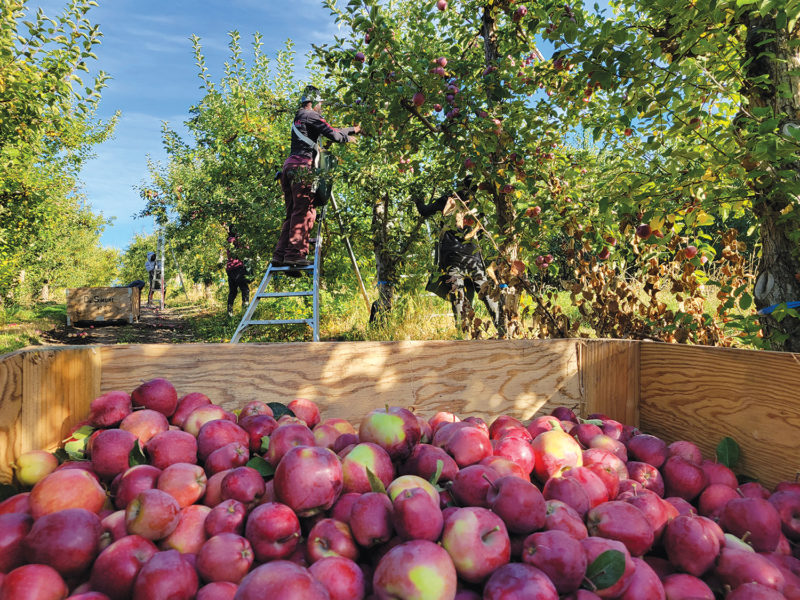KELOWNA – The province released 19 recommendations on November 12 outlining a plan to stabilize BC’s troubled tree fruit sector, the culmination of a nine-month process launched in February at the annual convention of the BC Fruit Growers Association.
“BCFGA is supportive and observe that the government recommendations have taken account of difficult times in the apple sector as well as climate impacts over the last three years in the cherry sector,” says BCFGA general manager Glen Lucas. “The input and dedication of the steering committee members and the grower and organization input is very much appreciated.”
The recommendations fall into 15 groupings, including leadership, governance and direction; labour supply and housing challenges; extension services; marketing, sales and the power of retailers; increased use of innovation and technology; and addressing the impact of climate change.
The recommendations are part of a report that makes several modest proposals under the larger headings. These include the removal of all older varieties that deliver minimal returns to growers and a quality assurance program for fruit similar to the Vintners Quality Alliance program for wineries. A call for a higher farm income for properties to receive farm class status from BC Assessment also figure among the ideas.
But the top recommendation is the creation of a single agency to represent the entire tree fruit sector within the BC Agriculture Council and to government. The province says the agency’s governance should include both industry representatives and government-recommended independent members.
In parallel with this, the BCFGA would be “realigned” to focus on lobbying, while yet another organization would be created to represent apple growers “at the same level as cherries and grapes.”
But the realignment would not be a marginalization of the BCFGA, which has more than 400 members and until this year administered the provincial replant program and other key government initiatives.
“We look at it more as a roundtable,” says BCFGA president Pinder Dhaliwal, who farms in Oliver. “The idea of a new agency would be more of increasing communication amongst various people in the valley and industry.”
While the BCFGA will continue to represent its members, the new agency would facilitate a more holistic discussion regarding the tree fruit sector, similar to the advisory committee convened to draft the recommendations.
“I think they want to have at that table grape growers, some cherry representation, some BCFGA representation, government – Ministry of Agriculture – and marketers, packers to shed light and perhaps even retailers to get things going,” says Dhaliwal.
The stabilization recommendations reflect feedback gathered during 30 consultation sessions with more than 165 stakeholders between April and June. The advisory committee included representatives from BCFGA, the BC Cherry Association, New Tree Fruit Variety Development Council, Sterile Insect Release Program, BC Grape Growers’ Association and Agriculture and Agri-Food Canada.
Georgina Beyers, director of the BC Ministry of Agriculture, Food and Fisheries’ industry development branch, and provincial tree fruit specialist Adrian Arts led the initiative.
The broad range of input is needed given that the challenges apple growers face, particularly low prices, have a ripple effect.
“People are pulling apples out and there’s two choices they have: either go into cherries or go into vineyards,” explains Dhaliwal. “It’s going to really upset the rhythm in those two industries in the short-term and I don’t think anyone wants that.”
BC agriculture minister Lana Popham says decisive action is needed because the sector continues to struggle despite having received more than $67 million in assistance from the province since 2017.
“We can all improve our effort, and our efforts are more meaningful when we work together,” she said in comments prefacing the report. “This plan will require commitment to the demanding work ahead and a dedicated approach and collaboration from industry and government.”
The recommendations now go to industry for consideration, pending implementation.
“A lot of those recommendations we agree with,” says Dhaliwal, who discussed the recommendations with BCFGA directors on November 18. “We just hope the government implements them. Some of them need to be implemented and worked on much faster and quicker, and some will take a little bit more time.”
BC Tree Fruits Cooperative strategic initiatives director Laurel Van Dam says the report brings together a number of long-standing recommendations, backing them up with a promise of concrete change.
“We all know the industry has been having some challenging times, and a step like this had to happen. Bringing those ideas together that will ultimately help move this business forward is a great step,” she says. “We’re very appreciative of the work that the ministry has done on the report. We congratulate and thank the ministry and all the staff and advisory group who worked on that.”
BCTF’s board was set to discuss the recommendations at its November 25 board meeting. Other groups, including the BC Cherry Association, are also studying the report prior to formalizing their responses.
The province would like implementation to begin sooner rather than later. It has promised to be “actively involved … alongside industry” in the implementation of the 19 recommendations.
“Goals will be set, and achievement progress will be monitored on a consistent, and specified basis,” it says.


 Frustration over “timber-centric” range bill
Frustration over “timber-centric” range bill